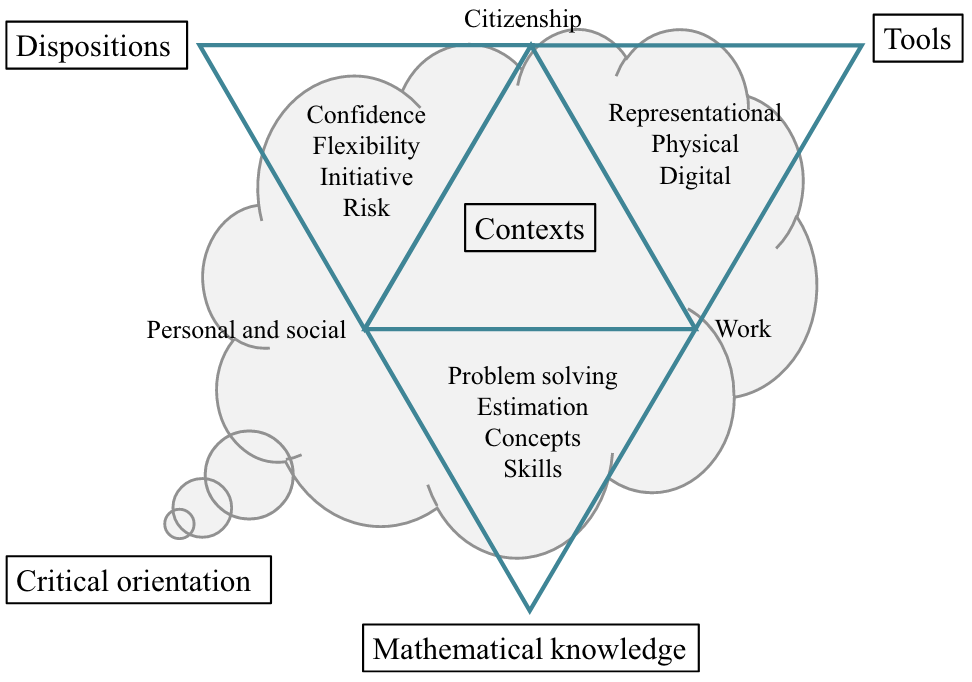When will I ever use mathematics#
See also: teaching-mathematics
Resources: Sir, when are we going to use this?
Why is it asked?#
- Struggling with current specific mathematics - as suggested by Mason (see below)
Methods for answering#
Shown in no particular order
Math as a badge of honour#
Do you find mathematics difficult? How many other people do you know that find mathematics difficult? What is a potential employer going to think when they see a insert top grade here (VHA/A/7 etc) for mathematics on your report card? Showing an ability to engage with a subject that people find challenging will say something about your nature, something an employer may like.
A related point was made in a comment with the example of a factory and the question do you want to be the guy on the production line or the engineer designing the product? Without mathematics you are limited to the "dumb" job. Perhaps linking to various flavours of the "skills crisis"
It's important for industry#
An electrician working at our place recently echoed this argument.
Especially given recent noises made by the Australian Skills Council about the limited numeracy skills of potential employees for trades and professional jobs. Which includes statistics like “53% of working age Australians have difficulty with numeracy skills”. And looks at reports on the maths skills of starting bricklaying apprentices
- 75% couldn’t do addition with decimals or subtraction requiring “borrowings”.
- 80% couldn’t calculate the area of a rectangle.
See also
Show how it is used#
Bolstad (2023) describe a model for mathematical literacy developed by Goos which consists of 5 inter-related elements: contexts, mathematical knowledge, tools, dispositions, and critical orientation. Contexts are at the center of the model and three contexts are highlighted as important.
- personal and social life;
- work-life; and,
- citizenship.
See also
The different contexts can be used to position possible answers for "when will I use it" with modelling from various folk to demonstrate.
Tell me what you will be doing#
It’s a bit hard to explain what you might use this mathematics for when I don’t know what you might do in the future. What do you want to do when you leave school?
At this stage I’m thinking of an exercise where the students write their future career plans on a post-it and stick it to their forehead. And then for me to do it with what I was thinking at 15 and what has happened since. i.e. 3 changes before I left high school, a completely different outcome after Uni, and two more career changes since then.
Then show a bit of the Did You Know video that mentions various trends like numerous common jobs didn’t exist 6 years ago, and that a new worker today will have on average 14 different jobs.
Further, could link to various examples of ("pure") mathematical knowledge that was shown many years later to be essential to some new technology. e.g. Fourier transforms and JPEG compression or RSA encryption.
"Lifting weights for the brain"#
A point argued for in this comment
e.g. redit post in that mathematics helps improve mental ability and problem solving skills - though with the caveat that how mathematics is taught can be problematic with overemphasis on memorisation or problem solving as algorithmic. Another post links more explicitly to drills in sports (e.g. ladder drills in soccer practice)
Another links it to employers wanting hires with "skills in numeracy, problem solving, abstract thinking and following complicated procedures and instructions"
See also:
Forget extrinsic value, it has intrinsic value#
e.g. redit post - quoting math teacher 'I don't care, we're going to learn it because I think it's fun"
What are you struggling with?#
John Mason describes his experience suggesting that students ask this question when they are struggling with whatever mathematics they are currently doing. Suggesting that a useful response might be to questioning them to find out what they are struggling with and then addressing that.
real-work-versus-real-world#
Context and a model of mathematical literacy#
Sources#
- Math sightings from the NTCM - collection of lesson plans for middle school to use mathematics to make sense of daily experiences
Explicit examples from different careers - USyd - student post - that uses university disciplines to demonstrate how mathematics is used to in the "real world" - BYU "We use maths"
References#
Bolstad, O. H. (2023). Lower secondary students' encounters with mathematical literacy. Mathematics Education Research Journal, 35(1), 237--253. https://doi.org/10.1007/s13394-021-00386-7
Otten, S. (2011). Cornered by the Real World: A Defense of Mathematics. The Mathematics Teacher, 105(1), 20–25. https://doi.org/10.5951/mathteacher.105.1.0020
